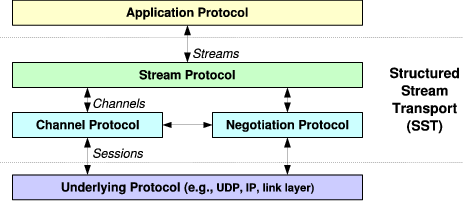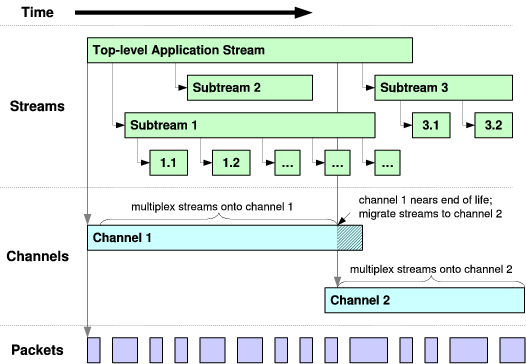Creating protocols
One of the building blocks of scalable applications
Case studies: AMQP; SPDY; SST;
- Proposed solution:
(31 slides! have patience...)

Context
- networked entities ubiquity;
- web-services are not a panacea;
Protocols
- what:
semantic (rules -> verification);
syntax (format -> serialization);
- means (transport);
- how to implement?
Case studies
AMQP -- Advanced Message Queueing Protocol;
SPDY;
SST -- Structured Stream Protocol;
SCP -- Session Control Protocol;
BEEP;
MUX;
AMQP -- Advanced Message Queueing Protocol
AMQP:
fully functional interoperability between conforming clients and middleware servers;
- defines a messaging model (i.e. entities, capabilities, etc.);
- defines a network level protocol;
- provides a protocol specification in XML (for code generation);
- references:
AMQP -- Advanced Message Queueing Protocol (2)
- features:
- virtual hosts;
independent, multiplexed channels;
- command based approach;
- data serialization format;
- authentication and versioning;
- layered architecture (transport, framing, brokering);
AMQP -- Advanced Message Queueing Protocol (3)
+------------------------+ | Application | +-----------+------------+ | +------------------------+ +---| API Layer |----Client API Layer-----+ | +-----------+------------+ | | | | | +------------------------+ +---------------+ | | | Connection Manager +----+ Framing Layer | | | +-----------+------------+ +---------------+ | | | | | +------------------------+ | +---| Asynchronous I/O Layer |-------------------------+ +-----------+------------+ | ------- - - - - Network - - - - -------
SPDY
SPDY:
a protocol designed for low-latency transport of content over the World Wide Web;
HTTP-like semantics for compatibility with existing HTTP application servers;
- references:
SPDY (2)
- features:
- independent, multiplexed streams (uni- or bi-directional);
- stream meta-data (i.e. headers);
- session configuration (e.g. concurrency, bandwidth, etc.);
- frame priorities;
- stream flow-control;
- authentication;
- compression;
- server-to-client streams;
SPDY (3)
SST -- Structured Stream Protocol
SST;
- features:
- independent, multiplexed streams;
- hierarchical streams;
- request / response pattern;
- stream prioritization;
- transport implementation over UDP;
- references:
SST -- Structured Stream Protocol (2)
SST -- Structured Stream Protocol (3)
Related work
- generic protocol modeling:
- generic protocol parsers:
UBF
- features:
- data transport format;
- protocol type system;
- protocol description language;
- references:
Getting Erlang to talk to the outside world (by Joe Armstrong);
UBF (2)
UBF (3)
+NAME("file_server"). +VSN("ubf1.0"). +TYPES ... files() = {files, [file()]}; getFile() = {get, file()}; ... +STATE start ls() => files() & start; getFile() => binary() & start | noSuchFile() & stop. +ANYSTATE info() => string(); description() => string(); contract() => term();
Proposed solution -- Features
- no special client / server roles (i.e. equal peers);
- multiple identities and protocols on the same endpoint;
- multiplexed, independent sessions;
- hierarchical, interdependent sessions;
- only message oriented sessions;
- arbitrary message exchange patterns;
Proposed solution -- Features (2)
- logical addressing;
- multi-part messages;
- eliminate handshake overhead;
- state-machine verification;
- code generators;
Proposed solution -- Responsibilities
transport
-- no (1)
framing
-- no (1)
addressing
-- yes
multiplexing
-- yes
verification
-- yes (2)
sequencing
-- yes
flow control
-- maybe
- (1) these is provided by the transport layer;
- (2) can be disabled at run-time;
Proposed solution -- Responsibilities (2)
prioritization
-- maybe
segmentation / reassembly
-- no (3)
error control
-- no (4)
encryption
-- no (4)
compression
-- no (4)
encoding / serialization
-- no (5)
authentication
-- no (5)
- (3) a whole message should fit into the transport layer limits (practically it should fit into memory);
- (4) this is the responsibility of the underlaying transport layer;
- (5) this is the responsibility of the application;
Proposed solution -- Design
Proposed solution -- Design (2)
Proposed solution -- Design (3)
message ::= { type :: enumeration, case type of master-session-initiation-request -> initiator :: end-point, target :: end-point; nested-session-initiation-request -> nesting-session; {master,nested}-session-initiation-request -> protocol; {master,nested}-session-{initiation,termination}-{request,acknowledgment}, exchange -> session; exchange -> % void end, payload-count :: count, payload * }(see mOSAIC interoperability);
Proposed solution -- Design (4)
end-point, session, nesting-session, protocol, method ::= universally-unique-identifier payload ::= { semantic :: universally-unique-identifier, role :: universally-unique-identifier, mandatory :: boolean, encoding :: universally-unique-identifier, schema :: scoped-unique-identifier(method), data :: length-prefixed-binary-string }(see mOSAIC interoperability);
Proposed solution -- Example
(protocol (name connection) (identifier "e7b45267-da3c-4954-b83e-c0630ae4bdef") (roles ((name client) (identifier "d6954b86-a74e-4e72-b026-366c13878125")) ...) (sessions ( (name connection) (identifier "f9a936a5-f09e-4b32-b713-1c54c31422d9") (type master) (roles client server) (messages ((name access-request) (type initiation)) ((name access-accept) (type exchange)) ((name access-reject) (type termination)) ((name select-request) (type initiation) (payload select-request)) ...)(see mOSAIC interoperability);
Proposed solution -- Example (2)
(exchanges ( (role client) (states (initial created) (intermediary access-pending ready) (terminal closed aborted)) (transitions ((name access-requesting) (when created) (next access-pending) (send access-request)) ((name access-accepted) (when access-pending) (next ready) (receive access-accept)) ((name access-rejected) (when access-pending) (next closed) (receive access-reject)) ((name disconnected) (when ready) (next closed) (send close)) ((name select-requesting) (when ready) (send select-request) (spawn select-operation (role client) (state pending)))) ((name self-aborted) (when access-pending ready) (next aborted) (send abort)) ((name peer-aborted) (when access-pending ready) (next aborted) (receive abort)))) ...)) ...)(see mOSAIC interoperability);
Proposed solution -- Example (3)
(payloads ( (name select-request) (identifier "0a320756-b799-47dd-9455-685ca610ae62") (encoding protocol-buffers) (specification (message "SelectRequest") (proto-file "key-value-store-select.proto"))) ...))(see mOSAIC interoperability);
Proposed solution -- Implementation
- technologies:
ZeroMQ (for transport);
JSON (for lightweight payloads);
Protocol Buffers (for binary, heavy payloads);
- code (version 0)
Erlang: erlang-drivers;
(see mOSAIC interoperability);
Future work
- implement version 1;
- benchmark it;
- publish it;
Questions?
(phew! done...)
Any questions???




